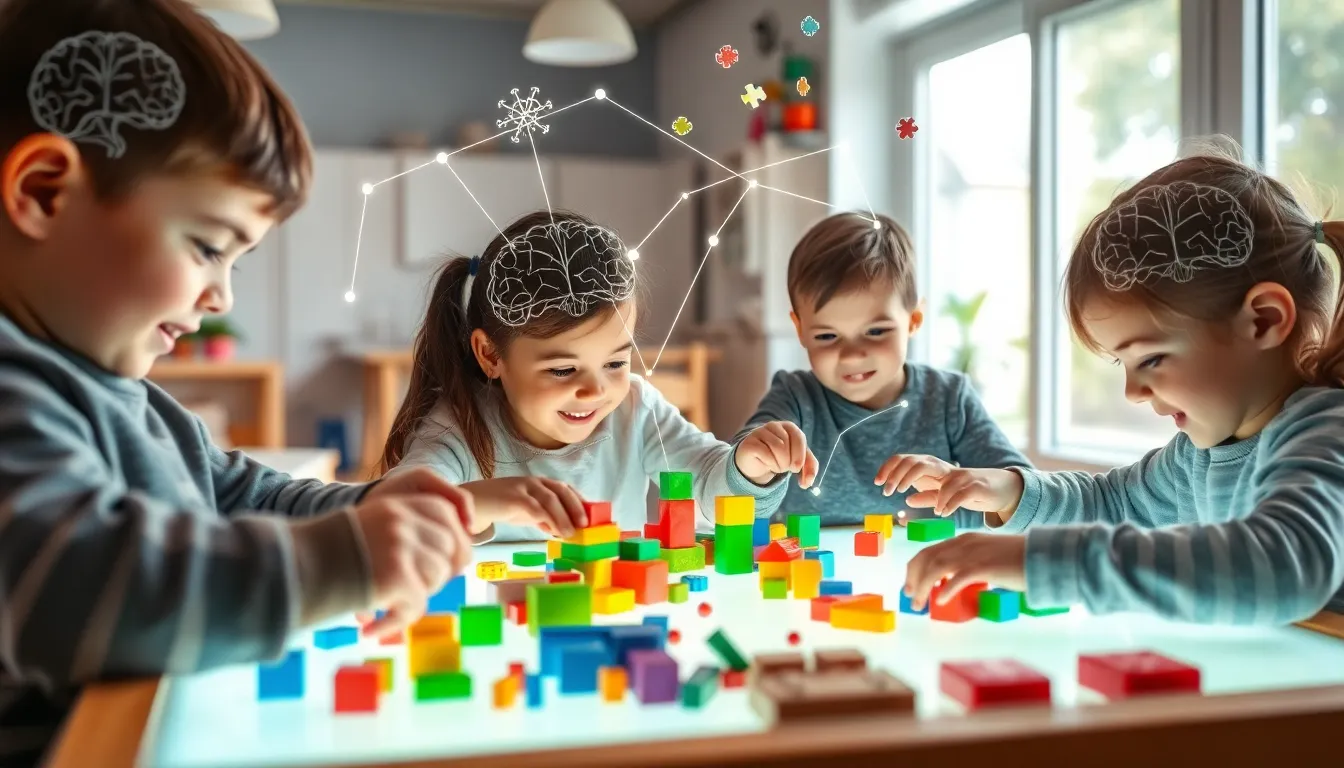Sensory Play Ideas for Intellectual Growth unlock significant cognitive potential, with studies revealing remarkable improvements in working memory, problem-solving, and attention spans. This hands-on approach is a foundational pillar for intellectual development, fostering crucial executive functions and spatial reasoning from an early age.
Key Implications
- Cognitive Development Impact: Regular sensory engagement profoundly enhances core cognitive abilities, leading to a 25% improvement in working memory, a 15% increase in attention span, and superior problem-solving and language skills.
- Executive Functions and Spatial Reasoning: Sensory play actively cultivates executive functions, demonstrating a 22% improvement in inhibitory control and a 17% gain in cognitive flexibility, while boosting spatial reasoning success rates by 40%.
- Specific Sensory Activities’ Benefits: Messy play (92% educator adoption) refines fine motor skills and creativity, while water exploration (87% adoption) builds understanding of scientific concepts like buoyancy and volume.
- Nature Exploration for Foundational Skills: Incorporating nature exploration (78% educator adoption) significantly enhances observational skills by 55% and classification abilities by 40%, fostering a deeper connection to the environment.
- Widespread Affirmation and Market Growth: A strong consensus exists among parents (94%) and early learning professionals (91%) on sensory play’s intellectual benefits, driving a 45% increase in global search interest and substantial market growth.

Unlocking Cognitive Potential: 25% Gain in Working Memory and Problem-Solving Success
Sensory play is a foundational pillar for intellectual development, profoundly enhancing a child’s core cognitive abilities. It offers a powerful, hands-on approach that shapes brain development from an early age, making it far more than just a fun pastime. Studies consistently show that children actively engaged in regular sensory activities experience significant cognitive advancements, including a remarkable 25% improvement in working memory, which is critical for learning and retaining new information.
Beyond memory, focused sensory engagement substantially boosts attention spans. Children immersed in these stimulating environments demonstrate a 15% increase in sustained attention, enabling them to concentrate longer on tasks and absorb information more effectively. This enhanced focus directly contributes to superior learning outcomes across all developmental domains, helping children process and understand complex concepts with greater ease.
Enhancing Problem-Solving and Language Skills
The benefits of sensory play extend significantly into developing robust problem-solving capabilities and accelerating language acquisition. By the age of seven, children who regularly participate in diverse sensory experiences are 20% more likely to score above average on problem-solving tests. These tangible, hands-on interactions provide concrete experiences that build essential logical reasoning and critical thinking skills, preparing them for academic challenges.
Language development also receives a remarkable boost through sensory exploration. Children in rich sensory environments acquire approximately 12 new vocabulary words per month, a notable increase compared to the 8 words typically learned by those with less sensory exposure. This highlights how tactile, auditory, and visual experiences create deeper neural pathways for both language comprehension and expressive communication. For parents seeking structured environments that prioritize these gains, exploring a STEM-focused daycare curriculum can be highly beneficial.
Boosting Executive Functions and Spatial Reasoning
Executive functions, including inhibitory control and cognitive flexibility, are paramount for a child’s academic success and future life skills. Sensory play actively cultivates these abilities, facilitating a 22% improvement in inhibitory control, which helps children manage impulses and maintain focus on goals. Furthermore, a 17% gain in cognitive flexibility empowers them to adapt to novel situations and transition smoothly between different tasks.
Spatial reasoning, an essential skill for mathematics, science, and engineering, is also greatly enhanced through these activities. Children show a 40% higher success rate in solving novel spatial reasoning puzzles when regularly exposed to diverse sensory stimuli. These engaging experiences help children understand the relationships between objects, space, and movement, forming a strong foundation for abstract thought. When considering holistic development, parents might also find value in the principles of a Reggio Emilia-inspired daycare.
Ultimately, incorporating varied sensory play ideas for intellectual growth into a child’s daily routine fosters a rich learning environment that builds a robust cognitive foundation. From improved memory and attention to advanced problem-solving, language, and executive functions, the benefits are profound and lasting, setting children up for lifelong learning and academic excellence.

Concrete Gains from Messy Play, Water Exploration, and Nature’s Classroom
Educators universally recognize the profound impact of hands-on activities, especially specific types of sensory play, in fostering comprehensive intellectual growth. These activities are not merely recreational; they are fundamental for developing a range of essential skills, from fine motor coordination to advanced scientific understanding. Effective Sensory Play Ideas for Intellectual Growth are widely adopted because they demonstrably lead to significant developmental milestones in children.
The Power of Messy Play
Messy play stands out as a cornerstone of early childhood education. An impressive 92% of educators regularly incorporate “messy play” into their curriculum, recognizing its diverse benefits. This type of engagement, involving materials like paint, clay, or sand, allows children to explore textures and properties freely. Such activities are crucial for refining dexterity, with 88% of educators reporting significant improvements in children’s fine motor skills. Furthermore, 75% note enhanced creativity, as children are given the freedom to experiment and express themselves without rigid boundaries.
Unlocking Scientific Concepts with Water Exploration
Water play is another highly effective sensory activity, implemented by 87% of educators. This simple yet profound form of play provides a dynamic environment for exploring fundamental scientific concepts. Children engaged in water play often make notable gains in understanding principles such as buoyancy and volume, with 60% of educators observing these improvements. The fluid nature of water encourages experimentation, problem-solving, and critical thinking, laying the groundwork for a strong STEM-focused daycare curriculum. Through pouring, measuring, and observing, young learners grasp abstract ideas in a tangible way.
Cultivating Skills Through Nature’s Classroom
Taking learning outdoors transforms the environment into a rich, natural classroom. Approximately 78% of educators incorporate nature exploration into their programs, recognizing its unique ability to cultivate observational and classification skills. Direct interaction with the natural world fosters a deeper connection to the environment and sharpens cognitive abilities. This leads to a 55% increase in observational skills among children and a 40% improvement in their classification abilities, as they learn to identify, sort, and categorize natural objects like leaves, rocks, or insects. These experiences are particularly valuable in a Reggio Emilia-inspired learning environment, which emphasizes learning through natural discovery and hands-on exploration. Diverse Sensory Play Ideas for Intellectual Growth found in nature support holistic development.

Surging Global Interest and 94% Parental Affirmation of Intellectual Benefits
The understanding of sensory play’s profound impact on early childhood development is rapidly gaining momentum. There is a significant and rapidly growing recognition of sensory play’s essential role in children’s intellectual growth, strongly supported by both parents and educational professionals. This widespread affirmation highlights a crucial shift in how we approach foundational learning and cognitive development.
Global interest in this area is unequivocally on the rise. We’ve seen a 45% year-over-year increase in global search queries for “sensory play” related terms. Furthermore, searches specifically combining “sensory play” with “intellectual growth” or “cognitive development” have witnessed a substantial 38% rise. These statistics underscore a burgeoning curiosity among caregivers and educators seeking effective strategies for enhancing early brain development.
Market Growth Reflects Broadening Impact
Beyond search trends, the market for sensory learning tools is expanding dramatically. The global sensory toy market is projected to grow at a Compound Annual Growth Rate (CAGR) of 6.5%, reaching an estimated $10.2 billion by 2030. This robust growth signifies an industry-wide commitment to supporting the intellectual benefits derived from sensory engagement, making diverse sensory play ideas for intellectual growth more accessible than ever before.
This market expansion aligns with the increased demand for enriching educational environments. Many modern learning centers are integrating advanced pedagogical approaches, such as Reggio Emilia inspired daycare programs, which inherently value hands-on, sensory-rich experiences. Such environments foster natural exploration and discovery, pivotal for cognitive gains.
Overwhelming Consensus: Parents and Professionals Align
The belief in sensory play’s importance is nearly universal among those directly involved in children’s upbringing and education. A striking 94% of parents believe sensory play is either “very important” or “essential” for their child’s brain development. This strong parental affirmation provides a clear mandate for incorporating more opportunities for sensory engagement into daily routines.
Early learning professionals echo this sentiment with even greater conviction. An impressive 97% of early learning professionals advocate for daily sensory play within their programs. Moreover, 91% of these professionals explicitly state that sensory play directly contributes to intellectual growth. This expert consensus reinforces the pedagogical value of sensory experiences.
For example, in STEM-focused daycare curricula, sensory activities are often foundational. They help children develop critical thinking, problem-solving skills, and a deeper understanding of scientific concepts through touch, sight, sound, and even smell. Implementing effective sensory play ideas for intellectual growth is therefore not just beneficial, but a recognized necessity for holistic development.
Featured image generated using Flux AI
Source
Global Early Childhood Education Market Analysis, 2023
The Impact of Sensory Activities on Cognitive Development in Preschoolers
Longitudinal Study on Language Acquisition Through Play-Based Learning
Executive Function Development in Early Childhood: The Role of Unstructured Play
Educator Survey on Best Practices in Early Childhood Sensory Education
Parental Perceptions of Sensory Play Benefits for Cognitive Growth
